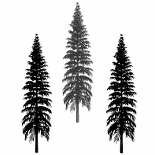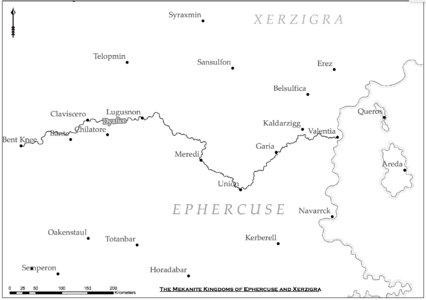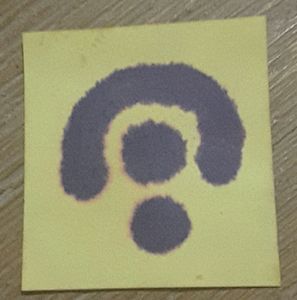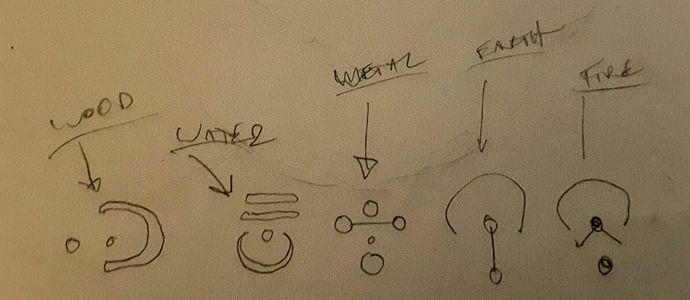Difference between revisions of "The Rift Wars"
(clean-up of home page) |
(added a hiistorical overview rather than bullet points) |
||
| Line 43: | Line 43: | ||
In the common tongue, the name of the known world is abbreviated to | In the common tongue, the name of the known world is abbreviated to | ||
| − | simply Ruk. | + | simply Ruk. Scholars categorise its history into two distinct stages |
| − | called the Durations. | + | called the Durations. The historical record spans three mellenia with |
the First Duration referring the time of the [[Ancient Republic]] and | the First Duration referring the time of the [[Ancient Republic]] and | ||
| − | the Second Duration as the [[The Age of Mek]]. | + | the Second Duration, the present age, as the [[The Age of Mek]]. The |
| − | + | term ''Duration'' came into the vernacular through the research of a | |
| + | Valentian scholar, Holbard Cobala, who argued that there were two | ||
| + | epochs to Ruk history and that the second epoch was looming as a fatal | ||
| + | repeat of the first, hence the term duration. Cobala's distopia | ||
| + | analysis is rejected by the followers of Mek. | ||
= Races = | = Races = | ||
Revision as of 09:21, 13 June 2016
Three mellenia have past since the world was cleft in two. Forsaken were the beings when the gods fell. The great rift defines all those that live beside, within or over its cliffs. Those that were to survive grew stronger and apart. First, were the elves who held a steel blade to the throats of any who dare question their reign. But their oppressive technocracy was to implode through their own bloody spite and treachery. Their time, the time of the Ancient Republic came to be known as the First Duration.
But as noble elvish blood seeped into the eddies and lakes of the dyafice, whom should rise but the scattered and nameless tribes of the uplands. A human conqueror, Mekzig, would lead the scattered tribes into battle and forever be immotalised as their God, Mek. But before long, the humans too learnt nothing from the fall of the Ancient Republic as turned to the brutal of their own instiutions to dominate all who dwelled along the rift's gearth. In their hearts, they looked up to their one true god, and down toward any other religious beliefs with singular intolerance. Forgotten would be the pluralist temples of the ancient Republic. Their time, the present age, described by sages as the Second Duration, is a time of war. The Rift Wars.
Little is written of how the rift came to be but many prophecies abound of its origin. For the church of men, the rift is evidence of the wretchedness of the ancient Republic and the poverty of a society once ruled by other kind. The rift avows the greatness of Mek, the one true God. But sages tell of other tales. In the alleys and courtyards of cities believers secretly pray to the old gods. In the farm houses and ale houses of villages the downtrodden look up to the heavens. Quietly though, beyond the reach of the Mekanites the fallen gods answer their prayers.
However, a wondrous new power lingers in the third mellenium. It is the battery of sorcerous energy the Mekanites call Thochthonism. Coming in many forms, from the wild energy of the sorcerer to the cloistered mastery of the wizard, Thochthonism is seen as threatening Mekanite power in the two kingdoms.
Contents
History
In the common tongue, the name of the known world is abbreviated to simply Ruk. Scholars categorise its history into two distinct stages called the Durations. The historical record spans three mellenia with the First Duration referring the time of the Ancient Republic and the Second Duration, the present age, as the The Age of Mek. The term Duration came into the vernacular through the research of a Valentian scholar, Holbard Cobala, who argued that there were two epochs to Ruk history and that the second epoch was looming as a fatal repeat of the first, hence the term duration. Cobala's distopia analysis is rejected by the followers of Mek.
Races
Gods and Demi-gods
Baltet
Pauwm
Mek
Theocracy - Chair and Robe
Magic (Toch'thonicism)
- Cursors - Nuer
Cities and Towns
- Claviscero - The Second Union
- Bent Knee
- Velentia - Falling Fortress
- Lugusnon - Midlight
- Bante
Notable Characters
- The Crown Exceptor
- First Mekae - Armand Pressarian
- Muir Durilix
- Teroaro Mahakanika
Adventures
Map
The Five Dies
Dwarves: Tale of the 5 glyphs/dies - metal, earth, fire, water, wood.
"All of the sons disappeared due to the betrayal of two of the sons. The son of earth and the son of metal."
Elves:
5 Sons - If the elememts are ever separated then it would cause the fall of the republic.
DM
- Ben Hall



